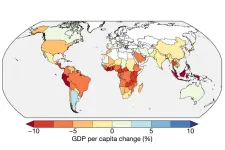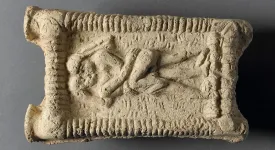(Press-News.org) For 21st century authors, the odds of writing a critical hit are much higher if the novel takes place in the past, not the present or future. Between 2000 and 2020, about three quarters of the novels shortlisted for the National Book Award, the Pulitzer Prize, and the National Book Critics Circle Award took place in the historical past.
“As a reader, you may not have even noticed the growing infatuation with history in literature because the historical novel has become such a diversely practiced form by such a wide array of writers, it's almost become invisible to us as a genre in itself,” said McGill English professor Alexander Manshel, author of the forthcoming book Writing Backwards: Historical Fiction and the Reshaping of the American Canon. Manshel documents how, since the early 1980s, key institutions in the American literary field have transformed to prize historical fiction and historical reenactments above all else. Since the 1980s, writers of colour have been canonized almost exclusively for the writing of historical fiction.
Through the exploration of works by authors including Toni Morrison, Colson Whitehead and Viet Thanh Nguyen, Manshel’s research examines the most celebrated historical genres—contemporary narratives of slavery, the WWII novel, immigrant fiction, the multigenerational family saga, and the novel of recent history—alongside the institutions that have elevated them over the past four decades.
Writing Backwards: Historical Fiction and the Reshaping of the American Canon is available for preorder.
END
Historical fiction: a guarantee of critical success or a trap?
More writers of colour celebrated than ever before, but mostly for a single genre
2023-05-18
ELSE PRESS RELEASES FROM THIS DATE:
Using 3D printing to improve implantable biomedical devices, touchscreens and more
2023-05-18
McGill researchers are exploring a new technique that uses 3D printing and hydrogels. It has the potential not only to improve biomedical implants but could also be useful in the development of human-machine interfaces such as touch screens and neural implants. Biomedical devices like pacemakers or blood pressure sensors that are implanted into the human body need to be fabricated in such a way that they conform and adhere to the body – and then dissolve at the right time.
Using 3D printing and hydrogel technology, researchers in McGill University’s Department of Engineering ...
Amputees feel warmth in their missing hand
2023-05-18
“When I touch the stump with my hand, I feel tingling in my missing hand, my phantom hand. But feeling the temperature variation is a different thing, something important... something beautiful,” says Francesca Rossi.
Rossi is an amputee from Bologna, Italy. She recently participated in a study to test the effects of temperature feedback directly to the skin on her residual arm. She is one of 17 patients to have felt her phantom, missing hand, change in temperature thanks to new EPFL technology. More importantly, she reports feeling reconnected to her missing hand.
“Temperature feedback is a nice ...
In years after El Niño, global economy loses trillions
2023-05-18
In the years it strikes, the band of warm ocean water spanning from South America to Asia known as El Niño triggers far-reaching changes in weather that result in devastating floods, crop-killing droughts, plummeting fish populations, and an uptick in tropical diseases.
With El Niño projected to return this year, Dartmouth researchers report in the journal Science that the financial toll of the recurring climate pattern can persist for several years after the event itself—and cost trillions in lost income worldwide. The study is among the first to evaluate the long-term costs of El Niño and projects losses that far exceed ...
Fear of large predators drives smaller predators into areas they perceive as safer, but where risk is greater
2023-05-18
Medium-sized carnivorous species – mesopredators like coyotes or bobcats – tend to move into human-dominated areas to avoid predation by larger carnivores, a phenomenon also known as the “human shield” effect. However, according to a new study, doing so places these safety-seeking species at considerably greater risk for mortality due to human activities. The findings describe a “paradox of the lethal human shield” for mesopredators, which could become an increasingly important driver of carnivore community dynamics and ecological trophic structures as species restoration and recovery efforts expand the coexistence of ...
Ancient history of kissing and its role in disease transmission
2023-05-18
In a Perspective, Troels Arbøll and Sophie Rasmussen review the ancient history of kissing, particularly the emergence of romantic-sexual kissing in Mesopotamia more than 4000 years ago and its role in the evolution and spread of orally transmitted diseases like herpes simplex virus 1 (HSV-1). They say the kiss cannot be regarded as a sudden biological trigger causing a spread of specific pathogens, as some research has recently proposed. “Evidence indicates that kissing was a common practice in ancient times, potentially representing a constant influence on the spread of orally transmitted microbes, such as HSV-1,” ...
Global analysis reveals widespread decline in lake water storage worldwide
2023-05-18
The amount of water stored in more than half of the largest lakes and reservoirs worldwide is declining, according to a new study. This drying is largely attributable to a warming climate and increased human impacts. The findings underscore the importance of accounting for these impacts in future surface water resources management strategies. Although they cover roughly 3% of the global land area, lakes hold 87% of Earth’s liquid surface fresh water. These features also provide essential ecosystem services and are key components in global biogeochemical processes. Many of these benefits are modulated by lake water storage (LWS), which ...
Unmanaged global forests have limited carbon sequestration potential
2023-05-18
Even if all direct human management of global forests ended immediately, their carbon sequestration potential would not be enough to curb ongoing climate change, according to a new study. The findings suggest that the planet’s current forests have only limited remaining carbon storage potential – even under the most unlikely of scenarios – to substantially mitigate atmospheric carbon dioxide (CO2) without major reductions in emissions. By capturing and storing carbon in biomass and soil organic matter, forests are integral to the global carbon cycle. As a result, the planet’s forests are often considered a central component in climate ...
Half of world's largest lakes losing water
2023-05-18
More than 50 percent of the largest lakes in the world are losing water, according to a groundbreaking new assessment published today in Science . The key culprits are not surprising: warming climate and unsustainable human consumption.
But lead author Fangfang Yao, a CIRES visiting fellow, now a climate fellow at University of Virginia, said the news is not entirely bleak. With this new method of tracking lake water storage trends and the reasons behind them, scientists can give water managers and communities insight into how to better protect critical sources of water and important regional ecosystems.
“This is the first comprehensive assessment of trends ...
Humanity’s earliest recorded kiss occurred in Mesopotamia 4,500 years ago
2023-05-18
Recent research has hypothesised that the earliest evidence of human lip kissing originated in a very specific geographical location in South Asia 3,500 years ago, from where it may have spread to other regions, simultaneously accelerating the spread of the herpes simplex virus 1.
But according to Dr Troels Pank Arbøll and Dr Sophie Lund Rasmussen, who in a new article in the journal Science draw on a range of written sources from the earliest Mesopotamian societies, kissing was already a well-established ...
Wiring up quantum circuits with light
2023-05-18
Quantum computers promise to solve challenging tasks in material science and cryptography that will remain out of reach even for the most powerful conventional supercomputers in the future. Yet, this will likely require millions of high-quality qubits due to the required error correction.
Progress in superconducting processors advances quickly with a current qubit count in the few hundreds. The advantages of this technology are the fast computing speed and its compatibility with microchip fabrication, but the need for ultra-cold temperatures ultimately confines the processor in size and prevents any physical ...
LAST 30 PRESS RELEASES:
National poll finds gaps in community preparedness for teen cardiac emergencies
One strategy to block both drug-resistant bacteria and influenza: new broad-spectrum infection prevention approach validated
Survey: 3 in 4 skip physical therapy homework, stunting progress
College students who spend hours on social media are more likely to be lonely – national US study
Evidence behind intermittent fasting for weight loss fails to match hype
How AI tools like DeepSeek are transforming emotional and mental health care of Chinese youth
Study finds link between sugary drinks and anxiety in young people
Scientists show how to predict world’s deadly scorpion hotspots
ASU researchers to lead AAAS panel on water insecurity in the United States
ASU professor Anne Stone to present at AAAS Conference in Phoenix on ancient origins of modern disease
Proposals for exploring viruses and skin as the next experimental quantum frontiers share US$30,000 science award
ASU researchers showcase scalable tech solutions for older adults living alone with cognitive decline at AAAS 2026
Scientists identify smooth regional trends in fruit fly survival strategies
Antipathy toward snakes? Your parents likely talked you into that at an early age
Sylvester Cancer Tip Sheet for Feb. 2026
Online exposure to medical misinformation concentrated among older adults
Telehealth improves access to genetic services for adult survivors of childhood cancers
Outdated mortality benchmarks risk missing early signs of famine and delay recognizing mass starvation
Newly discovered bacterium converts carbon dioxide into chemicals using electricity
Flipping and reversing mini-proteins could improve disease treatment
Scientists reveal major hidden source of atmospheric nitrogen pollution in fragile lake basin
Biochar emerges as a powerful tool for soil carbon neutrality and climate mitigation
Tiny cell messengers show big promise for safer protein and gene delivery
AMS releases statement regarding the decision to rescind EPA’s 2009 Endangerment Finding
Parents’ alcohol and drug use influences their children’s consumption, research shows
Modular assembly of chiral nitrogen-bridged rings achieved by palladium-catalyzed diastereoselective and enantioselective cascade cyclization reactions
Promoting civic engagement
AMS Science Preview: Hurricane slowdown, school snow days
Deforestation in the Amazon raises the surface temperature by 3 °C during the dry season
Model more accurately maps the impact of frost on corn crops
[Press-News.org] Historical fiction: a guarantee of critical success or a trap?More writers of colour celebrated than ever before, but mostly for a single genre




